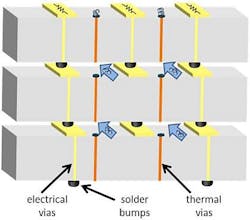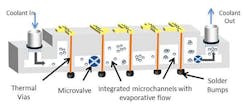DARPA asks industry to develop microelectronics with cooling built right into the chip
ARLINGTON, Va., 12 June 2012.Defense microelectronics experts at the U.S. Defense Advanced Research Projects Agency (DARPA) in Arlington, Va., are kicking off a major electronics thermal management program called Intrachip/Interchip Enhanced Cooling (ICECool), which seeks to design convective or evaporative microfluidic cooling directly into microchip designs and packaging.
DARPA released a broad agency announcement (DARPA-BAA-12-50) last week for the first phase of the ICECool program, called ICECool Fundamentals, which will explore revolutionary new thermal-management technologies for military electronics to help designers make substantial reductions in size, weight, and power consumption (SWaP).
DARPA microelectronics experts want to find ways to shrink chip-cooling technologies such that they can build cooling into the chip itself. The goal is to close the gap between chip and chip-cooling technologies for military electronics like computers, RF transceivers, and solid-state lasers.
The ICECool Fundamentals program focuses on developing the fundamental building blocks of intrachip and interchip evaporative microfluidic cooling as a first step toward future electronics designs with on-chip cooling built in (story continues below).
Essentially, DARPA scientists want to make cooling just as important as any other aspect of chip design, and use embedded thermal management to enhance the performance of military electronics. Integrating chips with convective or evaporative microfluidic cooling, DARPA officials say, has the potential to speed the evolution of advanced chip integration.
Specifically, the ICECool Fundamentals program seeks to demonstrate chip-level heat removal in excess of 1 kilowatt per square centimeter heat flux, as well as 1 kilowatt per cubic centimeter heat density with thermal control of local submillimeter hot spots with heat flux exceeding 5 kilowatts per square centimeter.
The program seeks to develop microfabrication techniques over two or three years to implement thermal interconnects and evaporative microfluidics in several microchanneled semiconductor chips. In addition, DARPA scientists want to model intrachip cooling with evaporative flows in microchannel flow loops -- either within the chips themselves, or in the microgaps between chips in 3D chip stacks.
One fundamental problem that electronic systems designers have today is the large size and weight of cooling subsystems. Ever-smaller chip geometries generate increasing amounts of heat, and the ability to cool electronics is moving more slowly than the ability to shrink chip densities.
This causes some advanced electronics to perform well below the inherent electrical limits of the device technology. Integrating cooling directly into the chip could transform electronic systems architectures and overcome the SWaP bottleneck in advanced electronics, DARPA officials say.
The ICECool program will complement other DARPA thermal-management initiatives, such as the Thermal Ground Plane (TGP) program to develop modern high-performance heat spreaders to replace the copper alloy spreaders in conventional systems; the Microtechnologies for Air Cooled Exchangers (MACE) program to develop enhanced heatsinks that reduce the thermal resistance and power requirements for cooling fans; and the Active Cooling Module (ACM) program to develop miniature, active, high-efficiency refrigeration systems based on thermoelectric or vapor-compression technologies.
The drawing above depicts DARPA's concept of an ICECool chip wafer
DARPA is interested in proposals that address stable, high-exit-quality evaporative microfluidic cooling systems; boiling initiation and localization measures; and microfabrication of high-aspect-ratio microchannels and micropores in electronic materials.
The ICECool Fundamentals program will involve several industry teams working on different substrates and on different thermal-management approaches. Resulting technologies are expected to feed into future efforts within the ICECool thermal management program.
Companies interested should respond to DARPA no later than 30 Aug. 2012, and DARPA would like abstracts no later than 27 June 2012. To respond, or for questions or concerns, contact the DARPA ICECool Fundamentals program manager, Dr. Avram Bar-Cohen, by e-mail at [email protected].
More information is online at http://www.fbo.gov/index?tab=documents&tabmode=form&subtab=core&tabid=f1db1a87e830a9348089c8db7551d439
Follow Military & Aerospace Electronics and Avionics Intelligence news updates on Twitter

